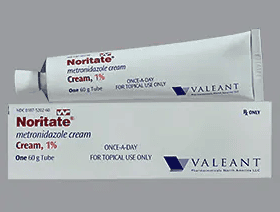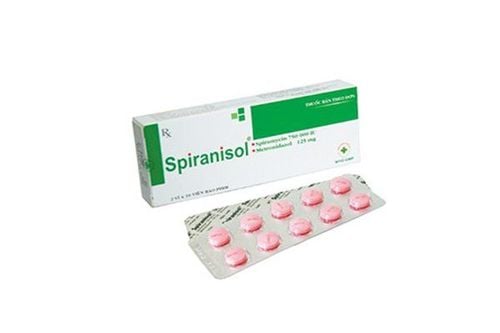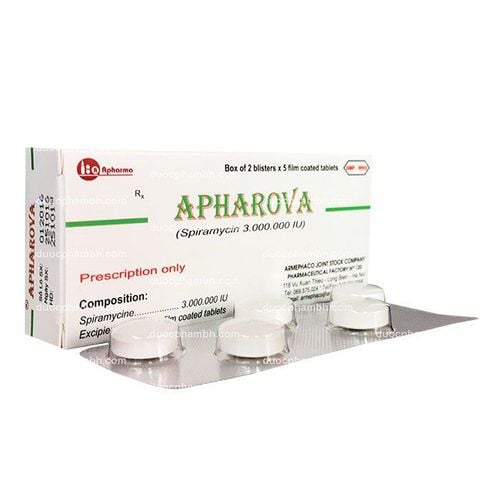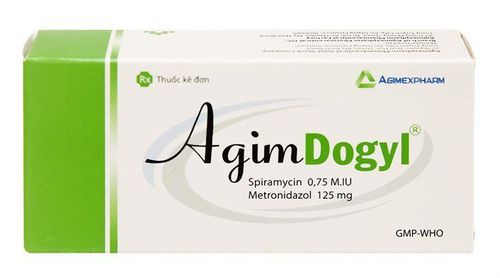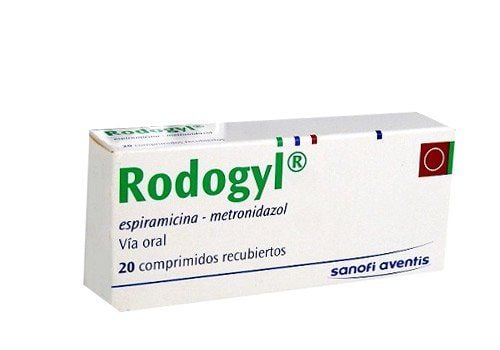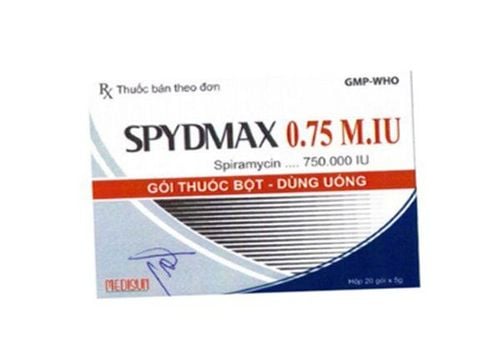This is an automatically translated article.
Arme rogyl is a medicine used to treat acute, chronic or recurrent oral infections, especially tooth abscesses, gingivitis, stomatitis, prevention of postoperative oral infections,... Article The writing below will help you better understand the uses of Arme rogyl medicine.
1. What is Arme rogyl?
Arme Rogyl is a prescription infection treatment drug made in the form of tablets consisting of 2 main ingredients, Spiramycin and Metronidazol, manufactured at 120 ARMEPHACO One Member Co., Ltd.
Each tablet contains the following ingredients:
Spiramycin contains 750,000 UI. Metronidazole contains 0.125g. Excipients (Magnesium stearate, PVP K30, Erythrosin, Talc, Titandioxyd, PEG 6000, HPMC, lactose monohydrate) just enough for 1 tablet.
2. Uses of the drug Arme rogyl
Spiramycin:
The component spiramycin is present everywhere in the body, reaching maximum concentrations in the major respiratory organs, and less in the cerebrospinal fluid and brain. Serum concentrations of the drug with bacteriostatic effect range from 0.1 to 3.0 micrograms/ml. The spiramycin component in the drug is absorbed fairly quickly but is not completely absorbed. It is absorbed in the digestive system at about 20-50% of the dose. It takes 2-4 hours to reach the normative plasma concentration of spiramycin. Food affects the absorption of spiramycin in the body. They reduce the concentration of the ingredient spiramycin by up to 70%, which takes more than 2 hours for the body to reach the norm. Metronidazole :
After use, Metronidazole is rapidly and almost completely absorbed. Approximately 1 hour after administration of 500 mg, metronidazole is present in plasma about 10 micrograms/ml. Metronidazole has a plasma half-life of approximately 8 hours and is evenly distributed throughout the body like water. About 10-20% of the drug is bound to plasma proteins. Metronidazole penetrates and is distributed throughout body tissues and fluids, and into both saliva and breast milk, achieving therapeutically appropriate concentrations in the cerebrospinal fluid. Indications:
Arme Rogyl (Spiramycin + Metronidazol) Armephaco 2X10 is indicated for use in the following cases:
Acute, chronic or recurrent oral infections, especially tooth abscesses, inflammation, inflammation perimandibular cellulitis, periodontitis, gingivitis, stomatitis, periodontitis, parotid gland inflammation, submandibular inflammation. Prevention of postoperative oral infections. Usage - Dosage of Arme Rogyl:
How to use: The drug is taken orally, taken with meals.
Dosage:
Adults: Take 4-6 tablets/day, divided into 2-3 times. In severe cases (attack treatment), the dose can be up to 8 tablets/day. Children 6 - 10 years old: Take 2 tablets / day, divided into 2 times. Children 10 - 15 years old: Take 3 tablets / day, divided into 3 times. Note: The above dosage is for reference only. The specific dose depends on the condition and the progression of the disease. To get the right dose, you need to consult your doctor or healthcare professional.
3. Arme Rogyl side effects
When using Arme Rogyl, you may experience undesirable effects (ADRs):
Digestive disorders: Stomach pain, nausea, vomiting, diarrhea. Allergic reactions: Urticaria. Metallic taste in the mouth, glossitis, stomatitis. Moderate leukopenia, which is reversible upon discontinuation of the drug. Rare and associated with prolonged treatment: Dizziness, loss of coordination, ataxia, paresthesia, sensory and motor polyneuritis. Urinary: Urine is reddish brown. Instructions on how to manage ADR: Inform your doctor about other undesirable effects encountered when taking the drug.
4. Notes when using the drug Arme Rogyl
Before using the drug you need to carefully read the instructions for use and refer to the information below.
Contraindications:
Related to metronidazole: Hypersensitivity to metronidazole and nitro-imidazole derivatives. Related to spiramycin: Hypersensitivity to spiramycin and erythromycin. Precautions for use:
Concerning spiramycin: Caution should be exercised when administering the drug to people with liver dysfunction because the drug may cause liver toxicity.
Related to metronidazole: Metronidazole has an inhibitory effect on alcohol dehydrogenase and other alcohol oxidizing enzymes. The drug has mild disulfiram-type reactions such as hot flushes, headache, nausea, vomiting, abdominal cramps and sweating. Metronidazole can immobilize Treponema pallidum, producing a false-positive response to the Nelson test. High doses for the treatment of anaerobic infections and the treatment of amoeba infections caused by Giardia can cause blood organ disorders and active neurological diseases.
Special notes and warnings when using drugs
Discontinue treatment when ataxia, dizziness and mental confusion. Note the possible risk of exacerbation of the mental status of persons with CNS or peripheral neuropathy, stable or progressive. Do not drink alcohol while taking the drug (causing antabuse effect). Monitor white blood cell count in case of history of blood dyscrasias or long-term or high-dose treatment. In the case of leukopenia, whether or not to continue treatment depends on the extent of the infection. Ability to drive and use machines: Not reported.
Pregnancy : Avoid use during the first 3 months of pregnancy unless absolutely necessary because the drug crosses the placenta.
Lactation: Avoid use while breastfeeding, unless absolutely necessary because the drug passes into breast milk.
Drug interactions:
Related to spiramycin
Concomitant use with oral contraceptives will reduce the effectiveness of preventing conception.
In relation to metronidazole
Should not be combined with:
Disulfiram (a drug used to treat chronic alcoholism), which can cause delusions and psychosis. Alcohol: Causes antabuse effect (hot, red, vomiting, heart palpitations...). Caution when combined with:
Warfarin : Increases the effect of anticoagulants and increases the risk of bleeding (due to decreased catabolism in the liver). When used in combination, it is necessary to regularly check the prothrombin level, adjust the dose of anticoagulants. Vecuronium (non-depolarizing muscle relaxant): Increases the effects of vecuronium. Use for patients with high blood lithium levels (due to taking lithium): Metronidazole can increase blood levels of lithium, causing toxicity. Fluorouracil: Increased toxicity of fluorouracil due to decreased clearance. Laboratory tests:
Metronidazole can immobilize spirochetes, thereby falsifying the results of Nelson's test. Heart beats fast. Storage:
Store in a cool, dry place, away from light.
Please dial HOTLINE for more information or register for an appointment HERE. Download MyVinmec app to make appointments faster and to manage your bookings easily.




